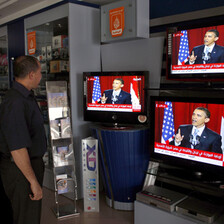The Electronic Intifada 8 December 2004
Democrats, searching for ways to regain ground lost to Republicans in November, should take guidance from an unusual source: a just-reported Defense Department study of attitudes toward the United States in the Arab and Muslim worlds. That study confirms that we are resented worldwide not for our freedoms but for our policies.
In particular, it is our support for Israel, and more recently our occupation of Iraq, that most offend 1.2 billion Arabs and Muslims. Friendly relations with this big slice of humanity are key to our economic and strategic well-being.
Democrats should seize the moment to champion Middle East policies that actually advance U.S. — not Israeli — interests. Our lavish support of Israel includes more than $90 billion in aid since 1949, our most advanced weaponry and 39 protective vetoes in the U.N. Security Council. This has been splendid for Israel — at least for right-wing forces there seeking permanent colonization of Palestinian lands. What is not clear is how this benefits us.
I wouldn’t cite Osama bin Laden as authority for much. But on his own motivations, there’s no better source. Per his recent video, bin Laden first envisioned “towers falling” in the United States during Israel’s 1982 invasion of Lebanon. That travesty alone killed more than 20,000 Palestinians and Lebanese and drove hundreds of thousands from their homes.
Democrats are just as responsible for our lack of even-handedness as Republicans. In his presidential campaign, John Kerry trumpeted his “100 percent voting record for Israel,” spoke of Israel’s “right to defend itself from terror” and distributed a syrupy account of his visit to Israel. Democrats and Republicans in Congress line up obediently behind the latest pro-Israel resolution — like one attacking the International Court of Justice decision on Israel’s illegal separation wall.
What would a pro-U.S. policy toward the Middle East involve? We would promote regional disarmament, encompassing Israel’s weapons of mass destruction (an estimated 200-300 nuclear weapons); foster genuine democracy in the region — not at gunpoint but instead through patient institution-building; and encourage a Palestinian-Israeli peace with equal rights for Jews, Muslims and Christians. Our best defense to terrorism is humane and fair policies toward the Middle East.

Haim Saban
It’s ironic that Democrats might not lose the “Jewish vote.” Jewish community leaders apparently support any Israeli government in power. But individual American Jews hold divergent views toward Israel. Some question a “Jewish state” that privileges Jews over Christian and Muslims. Others bridle at Israel’s brutal military occupation of Palestinian lands. Jews traditionally have voted Democratic for good reasons — separation of church and state, civil liberties, social values — and so they will continue. To assume they would place Israel’s interests first is to unfairly impugn their loyalty.
Many Americans would welcome a fair U.S. Middle East policy. During Israel’s 2002 mauling of the West Bank, 74 percent of Americans polled by CNN/USA Today favored economic and diplomatic pressure on Israel to reach peace. Fifty-six percent of Americans polled by the Council for the National Interest in April 2004 supported an “Israel Accountability Act” similar to that passed by Congress for Syria.
Although Republicans might equally embrace even-handedness, the Bush administration, with its pro-Israeli neo-conservatives and dependence on Christian evangelicals, cannot follow Democrats along this path. So here is a real opportunity for Democrats to create daylight between themselves and the Republicans. They will find broad, crossover support for putting U.S., not Israeli, interests first. Doing the right thing ultimately will prove to be politically wise.
Related Links
George E. Bisharat is a professor at Hastings College of the Law in San Francisco and writes frequently on law and politics in the Middle East. This article was first printed in the Seattle Post-Intelligencer today and is reprinted with the author’s permission.




